| Andes to Amazon | |||
| Ibike Ecuador | |||
| Dispatch 9 - Palora / Otto | |||
|
|||
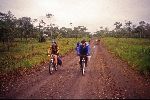 |
Paloma is a shade over 900m above sea level. Though it is almost 3000 feet it is much more tropical than alpine. (At the time the pictures were taken in 2001 the road from the highway was dirt, and in places treacherous. Within the next decade it was paved and suitable for any sedan in any season.) |
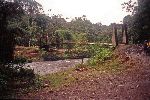 |
|
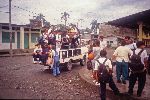 |
OK, there is nothing magnificently significant about Palora, but that doesn't mean that there aren't things of interest. Palora is a very quiet, rainforest town. Actually there has been so much clearing in the area, spurred on by national policies that people could lay claim to forest that they cleared, that Palora is now an edge-of-the-rainforest town. On one side of town is a large tea plantation, which from a distance looks like a fuzzy green table about 40 inches high. The commercial district in town is about four blocks long. Though none of the shops are very large they offer an amazingly wide range of goods and services. If you were going into relatively urban Palora, from the bush for a day, you could buy a can opener, fix your plow, get a hair cut and rent some computer time, before heading back to the more tranquil farming life in the forest. |
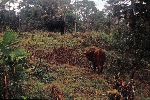 |
|
| The hotel was bigger and better than one might expect for the location. The rooms were self-contained with showers and toilets and large enough to completely empty the panniers and hang the damp contents. | |||
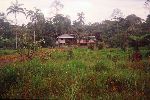 |
If it is gum boots you are looking for, for all I know there is no better selection of brands and sizes anywhere else on earth than Palora. Everyone in our group got a pair. We were advised that the recent rains would make the trails very muddy. Anyway no one in the group had owned a pair of good gum boots at any other time in our lives, they only cost about $6, and they were made in Ecuador. What a better and more unique souvenir of the rainforest could there be? | ||
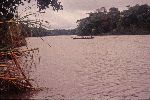 |
It rained heavily again over night. The project for the day was to cycle to a village on the shore of the Rio Llushin, cross it in a dugout canoe and hike to Otto, an indigenous Shuar village. The roads were wet enough so that it made sense for some of us to ride the bikes in gum boots -- quite a fashion statement with bike shorts. Try it in your community. | ||
| When we got to the river the water was still very high and bubbling. The river canoe man and woman were hesitant to cross the river. We killed a bunch of time discussing our options and eventually storing our equipment. In the coarse of time the river started dropping so crossing it became a possibility. Because of the chance of rain again overnight and the fact that we had to leave for Quito the next day, we decided not to overnight in the village, but just to visit and then return to the Palora side of the river and to Palora by night fall. This saved us from having to carry our overnight gear across the river and to the village. Eventually the canoe crew agreed to take us across. It was only after we had crossed that we learned that this was the highest water through which they had ever crossed -- usually there is more time in the Amazon to wait for a river than a bunch of gringos "on adventure" have. |
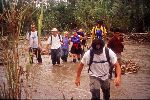 |
||
| To describe the trail as "a river ran through it" is a bit of an understatement. Large sections of the trail and surrounding land were covered with several inches of water. About the time we had gone through all the humor we could thing of about this and settled down with our gloating about our new boots, it was time to ford tributaries of the river. Initially, we all stepped carefully into the water which lapped at the top of our sixteen inch high boots. | |||
|
A few people made it across the first encounter, but one by one eventually everyone boots were inundated. Once flooded we could move much fast because we didn't have to pick our footing as carefully. It became a ritual to climb the river bank, raise our legs and dump the water out of our boots after each crossing. When we weren't thigh deep in the river we were hiking through a "cloud forest." For the moment the humidity was pretty condensed so we got the true cloud-effect. |
 |
||
 |
The village of Otto, our destination, sits on a cleared hill top above the river. Even though this was high land it was still saturated from the rains. The conditions made it was easy to understand why the houses are built on stilts. Other reasons for building above the ground are cooling and avoiding some snakes and other pests. The structures in the community included living quarters, kitchens, storage rooms and a school. Outside the school was an Ecuvolley court. This is a form of volleyball indigenous to Ecuador, and one of the most popular sports in the country. |
 |
|
| Our arrival was celebrated with a welcome drink, guayusa, made with leaf tea and panela. After introductions to several generations of an extended family and some discussion about there lives and ours, we were treated to lunch. This was chicken, yucca (cassava or manioc) and something called "china." |
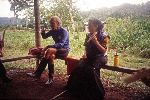 |
||
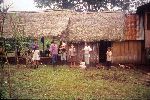 |
It definitely would have been interesting to stay overnight, which was part of the original plan, but we were all at least a little antsy to get back across the river so we wouldn't get trapped the next day. Where the hike in from the canoe took more than two hours, the hike back took an hour. A river in our path meant nothing. We marched in one side and marched out the other, pausing only long enough to do our "rélever" and "arabesques" to pour the water out of our boots. |
 |
|
 |
There was some growing apprehension when we got back to the canoe crossing. We couldn't raise the river men after fifteen minutes of whistling and yelling. It looked like the degree of our adventure was going to take quantum leap in volume -- were we going to be marooned overnight on the riverbank or was someone going to swim across the river. None-to-soon the river men appeared and we got safely back across the river and had another quandary about whether we should ride back to town or stay at the river. It was certain to be dark long before everyone would get to town, so we would have to hire a car to go back and retrieve any stragglers. Unfortunately, those with the most energy and speed at this point, spoke the least Spanish. In this case, this group fortunately didn't make a quick decision. By the time we were anywhere near making a decision so much time had passed that not even the fastest riders were going to arrive in Palora before dark so we decided to spend the night where we were. They opened the school for us, which was more than adequate. | ||
|
We were prepared for village camping,
so we had foam mats for the floor, it was spacious, dry and tranquil.
The real bonus of our pop-in arrangements was a great dinner by the river
man's wife. Well fed and sufficiently tired, we slept well. |
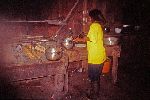 |
||
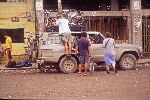 |
We had a wonderful set of experiences getting from Quito to the Amazon. We took an overloaded truck to get back. |
||
|
|
|||
   
|
|||
|
"Hosted by
DreamHost - earth friendly web hosting"
|
|||
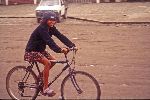
 Please
contact us
Please
contact us